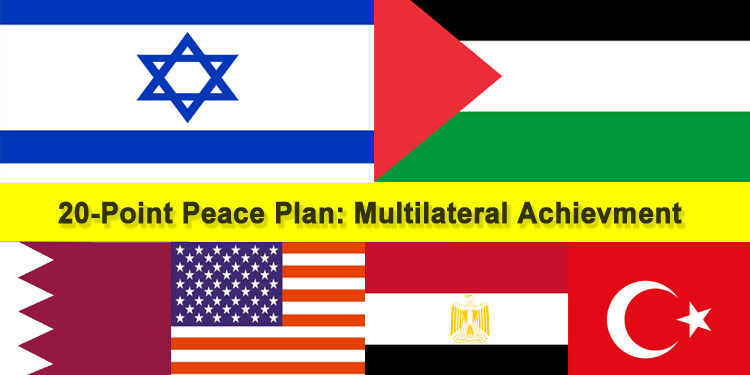by Miceál O’Hurley
CAIRO — Despite US President Donald Trump taking credit for the Gaza Peace Plan that promises to return hostages and prisoners as well as de-escalate hostilities in Gaza, the dedication, professionalism and critical background work of regional players and partners must be credited for creating a climate ripe for conflict resolution. Trump’s 20-point Peace Plan was, by all accounts, the final catalyst for this week’s phenomenal breakthrough. Humanitarian aid has started to flow to Gaza, Israeli’s pull-back of their forces is underway and displaced Palestinians have begun returning to what may be left of their former lives. The overall situation remains, however, an un-finished piece of work. Gaping policy goals and uncertain objectives in the 20-point Peace Plan still demands the further good will of all parties to keep the plan on-the-rails. Regional partners will need to continue to work the problems that remain, many of them arising from the broad strokes of the plan that still need functional details and roadmaps, to ensure the breakthrough of this remarkable multilateral cooperation achievement is sustained.
US President John F. Kennedy once quoted the proverb, “Victory has a thousand fathers – Defeat is an orphan“. And yet this critical milestone that is bringing some semblance of détente if not peace to Gaza and Israel continues to be widely attributed to Trump alone. It is a misreading of the situation. International partners, having long-laboured for a ceasefire, are refraining from claiming the credit due them and instead remain content with the humanitarian achievement and promise of a better future.
As for Trump, it has not gone without notice that for a man who this very week essentially declared war on his own cities, called his political opponents “enemies” and has directed his Attorney General to bring politically motivated charges against his political foes must still be credited with proposing a peace plan finally adopted by both Israel and Hamas. It is a remarkable achievement and despite all, the act is worthy of acclaim. The evidence that the Israel and Hamas have gone beyond adopting the plan to embracing it remains to be seen. While it is possible a more elegant solution was not possible, there remains much concern that the 20-point Peace Plan may prove too complex to achieve the global settlement of mutual cassis belli that has driven this conflict. This latest flare-up of violence has been but a feature of the overall state of conflict between Palestine and Israel dating even before the Balfour Declaration more than 100-years ago despite the more recent focus on the 7 October 2023 attack by Hamas that kicked-off the latest carnage.
Earlier this week, President Recep Tayyip Erdogan revealed that President Trump had asked Türkiye to convince Hamas to engage in the 20-point Peace Plan. According to a transcript released by the President’s office, “Both in our America visit and our latest phone call, we explained to Mr. Trump how a solution in Palestine can be achieved. He specifically requested that we speak to Hamas and convince them. We rapidly got in touch with our counterparts on this,” said Erdogan.
Türkiye and other regional partners have been hosted by Egypt in near round-the-clock negotiations for months attempting to bring an end to the carnage that saw over 65,000 Palestinians dead in the aftermath of the brutal Hamas attacks and kidnappings of 7 October 2023. Those attacks, largely upon Israeli civilians, killed some 1,200 Israelis with 251 hostages taken. The first round of deliverables from the 20-point Peace Plan includes the return of a remaining 48 hostages from Hamas control. Some 20 of the hostages are still believed to be alive though their condition remains in question. The deal also requires Israel to release at least 250 Palestinians from prison.
Egypt, whose border with Israel has meant they played a critical role in the region hosted and at times led the negotiations that made Trump’s 20-point Peace Plan possible. Thanks to Egypt’s diligence and skillful negotiations, the Rafah Border Crossing between Gaza and Egypt will open as soon as 14 October with the presence of an EU monitoring mission, EUBAM. If Türkiye can take credit for the lead on encouraging Hamas to engage with the 20-point Peace Plan, Egypt deserves equal praise for their leadership and engagement with the EU which will speed the normalisation of border crossings so vital to delivering humanitarian aid on the scale that will be required for the foreseeable future. The at-times highly technical negotiations led by Egypt in getting the Rafah crossing re-opened under EUBAM monitoring will prove critical to restarting what commerce and trade may be possible with Gaza Palestinians.
The incredible achievements brought about from Trump’s 20-point Peace Plan by no means resolves the critical outstanding problems the region faces. Israeli Prime Minister Benjamin Netanyahu has promised his hard-right coalition government he will not relent on allowing continued Israeli settlements in occupied territories despite they being a violation of international law. His boast that he will not relent until Hamas is entirely destroyed may not be achieved by a political solution to the conflict. Hamas’ commitment to peace remains uncertain given the mixed signals it often sends. The 20-point Peace Plan must be seen as a process rather than a deal.
The future governance of Gaza remains somewhat uncertain. The 20-point Peace Plan provides for a “temporary transitional committee of Palestinian technocrats” to govern Gaza under the supervision of a “Board of Peace” led personally by Trump and “involving former” UK Prime Minister Tony Blair. Who those Palestinian technocrats are remains anyone’s guess.
Gazans, while thankful for the respite from unceasing war for the past 2-years, remain concerned that Trump, a staunch ally of Israel who once boasted the US would “take over Gaza and turn it into a paradise“, even sharing an AI-video depicting it as a gaudy resort area with expensive residential developments largely devoid of Palestinians, is too closely tied to Israel to be a fair peace broker. Some project the Board of Peace will prove a vehicle tantamount to Western occupation that would ultimately undermine a 2-State Solution they hope will deliver lasting peace to the region. Israeli polls indicate its citizens now doubt the ability of Palestinians and Israelis can live in peace with only 21% indicating the belief coexistence is possible, the lowest recorded polling since 2013. The future remains uncertain.
Governance of Gaza would eventually be handed over to the Palestinian Authority under the 20-point Peace Plan once reforms are undertaken. The Palestinian Authority administers the West Bank. It remains to be seen if the Palestinian Authority can or will embrace the required reforms to govern Gaza as they have yet to be enumerated or clarified by the Board of Peace. Fears abound that Western powers will essentially impose their handpicked personnel to lead the Palestinian Authority and undermine the right of self-determination and democratic elections.
The process isn’t without precedence. Following post-World War II US governance of Japan, a model which saw Japan emerge as genuinely self-governing, sovereign nation governed by Constitution by 1952, included the rehabilitation of some 80,000 citizens purged for their wartime conduct and associations. Optimists believe a similar framework for reform in Gaza could see the Palestinian Authority govern both the West Bank and Gaza in a relatively short period all while reconstruction takes place. Pessimists, many including Israeli hardliners who have encouraged illegal settlements and condoned settler violence against Palestinians, believe any plan that will rehabilitate Gaza and empower the Palestinian Authority is doomed to lead to future conflict.
The future of the Netanyahu government may have great bearing on the region’s future and the 20-point Peace Plan’s success. Personally, Netanyahu faces a continuing corruption trial that threatens his future ability to govern as well as his personal freedom. International calls for him to be prosecuted for his conduct of the war in Gaza, including claims of engineering genocide, linger. His ruling, far-right coalition includes the likes of Itamar Ben-Gvir, the National Security Adviser and bellicose hardliner who along with Finance Minister Bezalet Smotrich. Each has repeatedly threatened to collapse the coalition if Netanyahu entered into ceasefire agreements or extended amnesty to Hamas fighters and leaders. Netanyahu seems set for domestic political battles both inside his governing coalition and with his political opposition that he may not survive.
Overall, the developments of the past week provide hope. The recognition of Palestine by France and others seems primed to encourage others to finally recognise the Palestinian State. Israel seems to have recognised war will not return hostages nor will it destroy Hamas entirely. The 20-point Peace Plan leaves much to be desired but must be recognised as the best hope for a durable peace if it can be sustained.
As for Trump Trump complaining he did not receive this year’s Nobel Peace Prize? Providing the peace holds, humanitarian relief flows and reconstruction advances at pace, he might be surprised to be a contender in 2026 sharing a nomination with Erdogan, El Sisi, Tamim bin Hamad Al Thani the Emir of Qatar and other regional partners who made the 20-point Peace Plan possible. Stranger things have happened.
















































